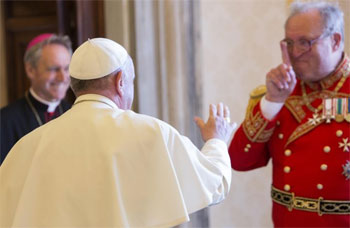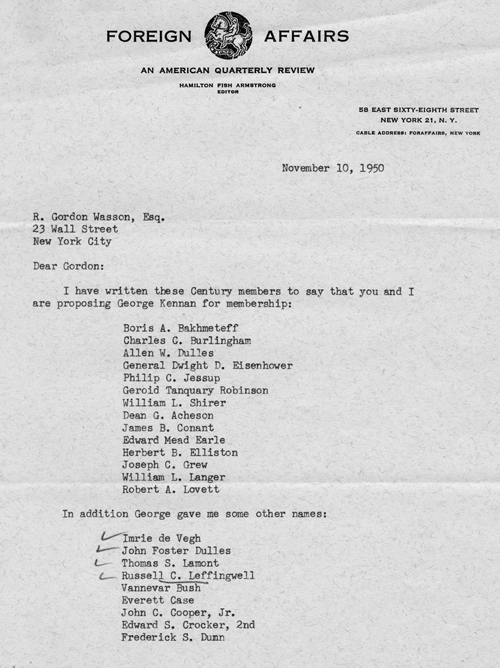Knight of Malta and Freemasonryby Robert Moynihan
Letter #4, 2017
January 25, 2017
“Charybdis was a sea monster in Greek mythology, which dwelt in the Strait of Messina. It was later rationalized as a whirlpool. It was believed that Charybdis lived under a rock on one side of the strait. Opposite Charybdis, Ancient Greeks believed there was another sea monster, Scylla, which lived inside a rock. Since the passage between the two monsters was very narrow, sailors who tried to avoid one sea monster would unavoidably get into reach of the other.” — from a website on Greek Mythology, link
The Plot ThickensYesterday, the Grand Master of the 13,000-strong Sovereign Military Hospitaller Order of Saint John of Jerusalem of Rhodes and of Malta, Fra Matthew Festing, hurried across Rome from his order’s headquarters near the Spanish Steps, on the most luxurious shopping street in all of Rome, the via Condotti, toward Vatican City.
Pope Francis had summoned him to a meeting.
At about 5 in the afternoon, Festing entered the Vatican and proceeded to the Domus Santa Marta guest house, where the Pope lives.
There, the two men huddled for a private meeting.
At the end of the meeting, Pope Francis asked Festing to submit his resignation as the head of the Knights of Malta.
Today, Festing did so, with communiques from both the Vatican and the Knights of Malta announcing the news of the resignation, and the news that Pope Francis has accepted the resignation. (Though, technically, the resignation must be presented on January 28 to the Malta order’s governing council, which must accept it to make it official, and only then inform the Pope for his knowledge; but the Pope’s acceptance of the resignation having already occurred, it is not clear what purpose the January 28 meeting can have.)
Here below, a picture of Pope Francis with Festing, who has just resigned as head of the Knights of Malta; in the background on the left is Archbishop Georg Gaenswein, Prefect of the Pontifical Household and personal secretary of Pope Emeritus Benedict XVI
So the Knights of Malta are suddenly without a leader.
Moreover, in a further startling development, the Vatican has announced that Pope Francis will soon announce his personal choice to be his “delegate” to temporarily run the more than 900-year-old military order. of Malta.
This is unprecedented. The order has always elected its own Grand Master. Never has a Pope acted in this way before toward the order. And this has raised eyebrows worldwide. (link and link)
In the first link just cited, Ed Condon writes in the Catholic Herald of London, “The most remarkable thing about the Order of Malta controversy is not that the Grand Master, Fra’ Matthew Festing, has resigned. That is extraordinary enough, especially given that it was apparently on the invitation of Pope Francis. No, the most astonishing feature of the story is today’s announcement that the Pope will install an Apostolic Delegate to run the Order. In effect, this abolishes the Order as a sovereign entity. Under international law, what we are seeing is effectively the annexation of one country by another.”
So this action of Pope Francis is a dramatic break with all of the order’s history up to now.
What does it mean?
In this case, as in so any others, the old adage again applies: “Those who know don’t talk, and those who talk don’t know.”
But perhaps we may catch at least a glimpse into the meaning of these events if we study the various official communiques and media reports, while for context and background we rely on several off-the-record conversations recently in Rome.
These reports and these conversations suggest that a struggle of considerable importance is currently underway in Rome, in the global Church, and in the world outside of the Church, over the direction humanity will take in the years and decades to come.
There are presently two huge threats to the Church, a Scylla and a Charybdis which the Church must pass between or be profoundly harmed: the rejection of traditional Church teaching in order to accommodate the Church to the teaching of “the world,” on the one hand, and, on the other hand, schism.
The first would betray the Church’s nature and mission; the second would cost the Church dearly as the world would likely exploit the divisions in a devastating way.
The battle over the leadership of the Knights of Malta must be seen in this context.
Moreover, during the past several months, quietly and privately on most occasions, but sometimes publicly, a word has been whispered and spoken aloud in Rome in a way unlike any other time in the 33 years that I have been writing about Vatican affairs. That word is freemasonry.
“The fact is that the thought of freemasonry, which was the thought of the Enlightenment, believes Christ and his teachings, as taught by the Church, are an impediment to human freedom and self-fulfillment,” a retired Vatican official told me. “And this thought has become dominant in the elites of the West, even when those elites are not officially members of any freemasonic lodge. It is a pervasive modern worldview.”
This bears repeating and emphasizing: in any particular case, it may not be so much actual membership in a masonic lodge that is involved, but rather adherence to principles of that “masonic thought” which views man in a “Promethean” way, that man should “steal fire from heaven,” wrest it from the gods for the benefit of men, seek ever greater knowledge (computers, the genetic code, transhumanism, Homo Sapiens Version 2.0, “better” than the species currently is), not accepting any limit to the human ambitions to “be like gods.”
How does this relate to the shake-up at the top of the Order of Malta?
Well, there have recently been an allegation that a high-ranking member of the order (not Festing) approved decisions not in keeping with Catholic moral teaching, and more precisely, sent condoms and other contraceptives in shipments of medical supplies to poor countries — that is, allowed a certain “non-Catholic moral view” to enter into the order’s decision-making.
And, published reports have stated something that few have noted, but which must be studied and explained: that Pope Francis, in a meeting in November with Cardinal Raymond Burke, gave Burke a very unusual instruction.
The Pope, it is reported, during their November 10 meeting, asked Burke, the American cardinal who is the ecclesial Patron of the Knights of Malta,
to carry out an important and delicate task: to ferret out and remove from the Knights of Malta all members who are… freemasons.
Here is the published source for this information, which comes about halfway through a quite thorough and rather lengthy article which bears reading in full. It is by Edward Pentin published in the National Catholic Register on January 7:
“Hopes that the contraceptive scandal would be addressed came on Nov. 10, when Cardinal Burke was received in private audience by Pope Francis.
“During that meeting, the Register has learned, the Pope was ‘deeply disturbed’ by what the cardinal told him about the contraceptive distribution.
“The Pope also made it clear to Cardinal Burke that he wanted Freemasonry ‘cleaned out’ from the order, and he demanded appropriate action.
“The concern was followed up by a Dec. 1 letter to Cardinal Burke, in which the Register has learned that the Holy Father underlined the cardinal’s constitutional duty to promote the spiritual interests of the order and remove any affiliation with groups or practices that run contrary to the moral law.” (link)
Here, repeated, is the critical phrase:
“The Pope also made it clear to Cardinal Burke that he wanted Freemasonry ‘cleaned out’ from the order…”
Where does this information come from? How reliable is it?
Pentin tells us quite matter-of-factly that “the Register has learned” about the contents of Burke’s November 10 meeting with the Pope.
Evidently, Pentin either spoke with Burke himself, or with someone close to Burke, perhaps one of his secretaries, or he spoke with Pope Francis, because it does not seem possible that anyone other than Burke and Pope Francis could be the source of news about a private conversation between the two men, and about a private letter sent by one to the other.
In short, Burke, seen as one of the leaders of the “traditional” faction in the Church and in the College of Cardinals because of his raising questions about the “progressive” teaching of Pope Francis, especially in Amoris Laetitia, was evidently, in this case, as recently as November 10, and again in a December 1 letter, asked by Pope Francis to carry out a very delicate task, and to do so urgently.
But this would suggest that the two men have a different relationship than the one most of the world seems to have concluded they have…
(to be continued)
About Robert Moynihan
Dr. Robert Moynihan is founder and editor-in-chief of Inside the Vatican magazine. He is an American journalist with a knowledge of five languages and a seasoned Vatican analyst. He earned his B.A. in English, magna cum laude from Harvard and a M.A and Ph.D. in Medieval Studies from Yale. Robert’s thesis was The Influence of Joachim of Fiore on the Early Franciscans: A Study of the Commentary Super Hieremiam. Other research fields included: History of Christianity, Later Roman Empire and The Age of Chaucer. Moynihan also received a Diploma in Latin Letters from Gregorian University in Rome, Italy.


